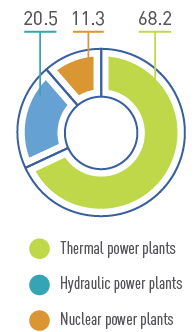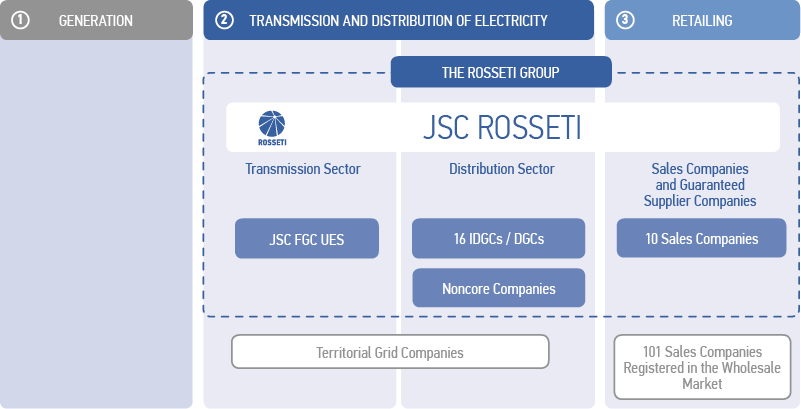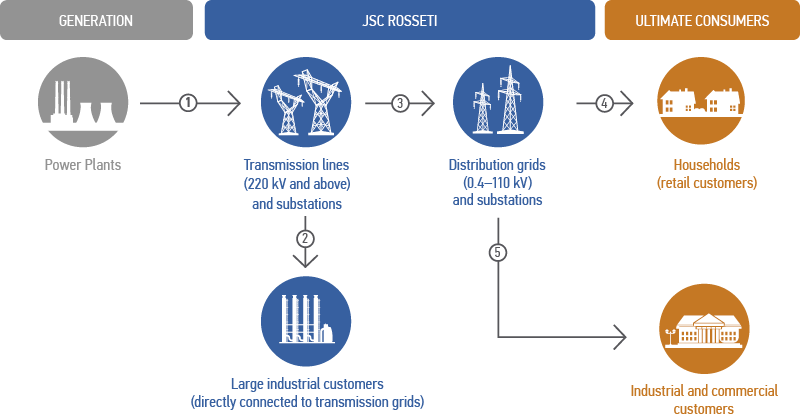The electric power industry is Russia’s basic economic sector. Reliable operations of the industry are a prerequisite for Russia’s energy security and successful economic development.
JSC ROSSETI is one of the most significant infrastructure companies in Russia. The Company is one of the largest in the world by number of consumers and grid length (voltage less than 110 kV), and a leading company on the Russian market by adoption of innovative technology in the electricity transmission and distribution segment.
The following long-term strategic development priorities are set to Russian electric grid sector as a whole and JSC ROSSETI in particular:
- securing a reliable electricity supply for customers;
- ensuring service quality;
- developing the infrastructure to support Russia’s economic growth;
- introducing competitive electricity tariffs that should be adequate to meet the need for developing the industry;
- developing scientific and innovative potential if electric grid sector, including to encourage the development of related industries.
ROSSETI operates in the electricity transmission and distribution segment. As the largest electric grid company in Russia, we are a combination of electricity transmission grid facilities and interregional and regional electricity distribution grid companies
The Russian current electric power industry consists essentially of three segments: electricity generation, electricity transmission and distribution, and electricity retailing. Generation in Russia comprises more than700 power plants, each with capacity of over 5 MW. The overall installed capacity of Russian power plants exceeds 223 GW and is structured as follows:

The electricity market in Russia is competitive: natural monopoly functions (electricity transportation and operational dispatching control) are, to a large extent, separated from potentially competitive functions (electricity generation and retailing, repair and service operations). Electricity market prices are driven by supply and demand, and competition among market participants reduces their costs. Natural monopolies are regulated by the government, which forms the infrastructural basis for the competitive electricity market.
The Russian electricity and capacity market is composed of two tiers: wholesale and retail
Grid companies are also among buyers in the wholesale market because they purchase electricity and capacity as compensation for network losses. The electricity and capacity market is operationally present in the regions united into price and nonprice zones. The first price zone comprises the European part of Russia and the Urals, and the second is Siberia. The nonprice zones (Arkhangelsk Region, Kaliningrad Region, Komi Republic, and Far Eastern regions), where it has not been technically possible to organize competitive market relations yet, are subject to government regulation with respect to trading in electricity and capacity.
Retail market participants are electricity consumers, suppliers of last resort, electricity retailers, energy suppliers, public utility providers, grid organizations (IDGCs) and other owners of electric grid facilities, and generators that do not supply power to the wholesale market. Government-regulated tariffs apply to all electricity deliveries to households and a wide range of social infrastructure facilities. Starting from January 1, 2011, all the other customer categories receive electricity at unregulated prices.
Retailers buy electricity in the wholesale market from generation companies and use the electricity transportation services of transmission and distribution grids to resell electricity in the retail market.
The government acts as the electricity market regulator.
In addition to the Ministry of Energy, through which the government exercises its authority to manage the industry, the Market Council applies market self-regulation mechanisms to organize trading in electricity and capacity in the wholesale market.


| Federal Executive Authority / Control Body | Scope of Responsibility / Programs |
|---|---|
|
Government of the Russian Federation |
Strategy for Development |
|
Ministry of Energy of the Russian Federation |
Formulation of government policy and legal regulations on energy, including electric power issues / Investment Program and reliability |
|
Federal Tariff Service of the Russian Federation |
Legal regulation in the government regulation of prices (tariffs) of goods and services, including setting electricity distribution tariffs |
|
Federal Antimonopoly Service of the Russian Federation |
Antimonopoly regulation in the electric power industry |
|
Federal Service for Environmental, Technological and Nuclear Supervision of the Russian Federation |
Technical inspection and supervision in the electric power industry |
|
Ministry of economic development and trade of the Russian Federation |
Macroeconomic parameters |
|
Rosimushchestvo |
Corporate governance |
